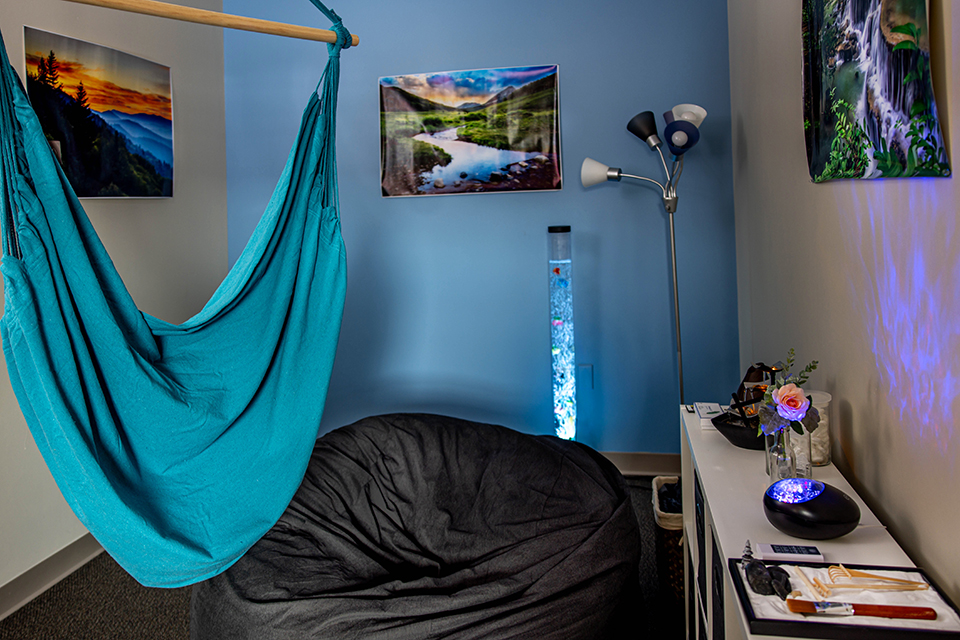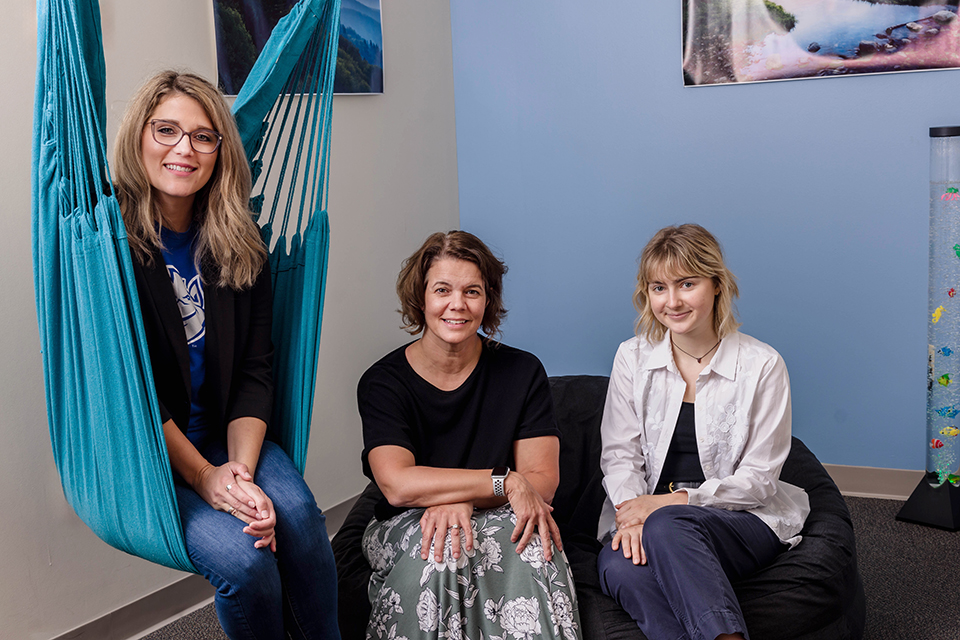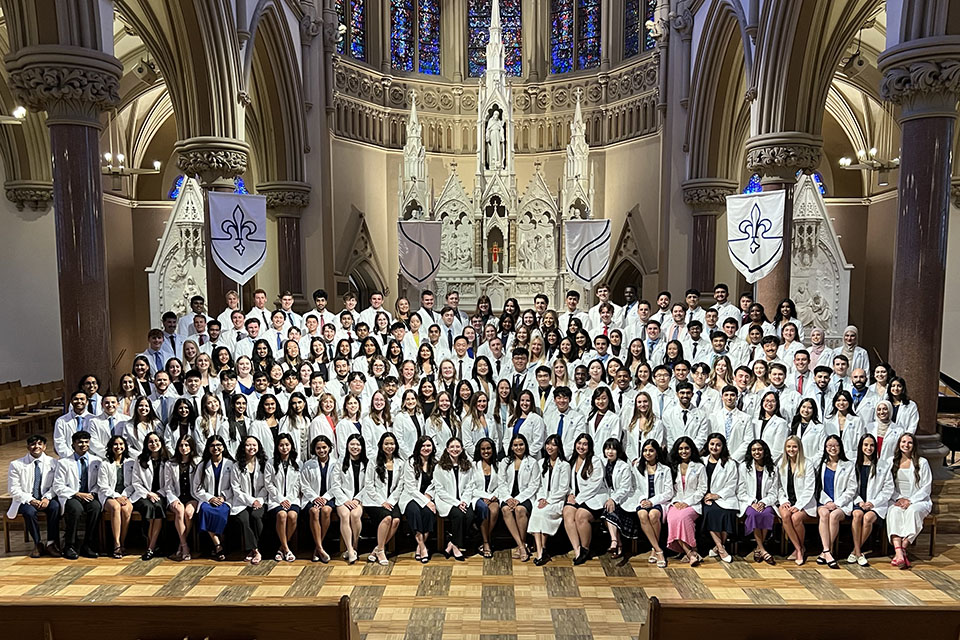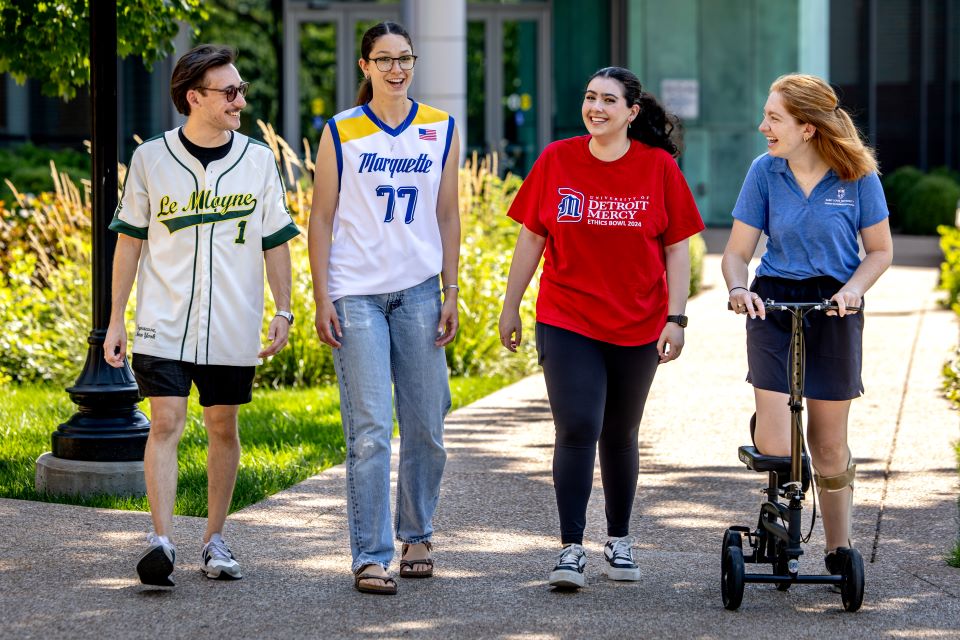Saint Louis University Helps Students Thrive with Sensory Room
ST. LOUIS — The dimly lit sensory room smells like lavender. A swing hangs from the ceiling for balance and coordination. A bean bag is in a corner near a weighted blanket. A bubble tube and sand are on a shelf. In cubby holes are coloring books, fidgets, mints and gum. There are also noise-cancellation headphones and laminated handouts with QR codes that link students to calming sounds.
When the outside world becomes too much, Saint Louis University’s sensory room is a space students can visit to take a moment to reset.

The sensory room in the Center for Accessibility and Disability Resources at Busch Student Center. Photo by Sarah Conroy.
The human brain is designed to regulate how we react to sensory inputs — everything we hear, see, smell, taste and touch. This link between the brain and our behavior is called “sensory integration.” For most people, this is an unconscious part of the daily experience. But for an individual with a developmental disorder, such as autism or a sensory processing disorder, the way the brain processes these experiences can be a source of distress and discomfort.
Incorporating sensory breaks into a person’s day provides many benefits. Studies have shown that even a short period in a sensory room can leave people feeling more focused and relaxed, less stressed, and better able to communicate with others. They can solve problems more effectively, be better equipped to accomplish tasks and be more sociable overall. Creating a sensory space can be very beneficial at home, school, or work.
SLU’s sensory room, located in the Busch Student Center, is a safe space designed to provide room for individuals with a sensory processing disorder to decompress and productively cope with sensory issues.
The idea was born when a faculty member saw a need.

From left, Kendra Johnston, director of the Center for Accessibility and Disability Resources, Sarah Zimmerman, assistant professor in the Department of Occupational Science and Occupational Therapy, and occupational therapy graduate student Jillian Vlasak, in the sensory room at Busch Student Center. Photo by Sarah Conroy.
Sarah Zimmerman, OTD, assistant professor in the Department of Occupational Science and Occupational Therapy at SLU, noticed that sensory integration tended to be geared toward young children. She believed the therapy could be beneficial for young adults, too.
“Why would these things also not work for teens and young adults to help them maintain a calm, alert state?” Zimmerman wondered. “There’s a void that needs to be filled.”
Zimmerman collaborated with Kendra Johnston, director of SLU’s Center for Accessibility and Disability Resources (CADR), and occupational therapy graduate students, to design a space that could provide sensory support to students.
Jillian Vlasak, a first-year occupational therapy grad student, was among the students instrumental in designing the space.
“There's not a lot of research on its effectiveness with adults. But I think we're realizing that we need this just as much as the developing child does,” Vlasak said. “It's all like the brain plasticity, and using a room like this will prevent those emotional meltdowns from being overstimulated in a college atmosphere.”
Though designed for those with sensory processing disorders, the sensory room is open to all students who may need a quiet place to go and regroup, regardless of whether they have a disability or not. Students can also meet with an occupational therapist to obtain a sensory profile to identify their sensory preferences and develop regulation strategies.
Johnston notes that there is an increasing need to support students with disabilities.
“We're seeing a big increase in students with autism spectrum disorder, for example, who are coming to campus and connecting with our office,” Johnston said. “In some cases, these are folks who also have sensory concerns. This is one of several resources on campus that can help to reduce some feelings of anxiety or depression, which can go along with sensory processing disorder that our students may be feeling.”
The sensory room, located in Busch Student Center, is open from 8:30 a.m. to 5 p.m. Monday-Friday during the CADR’s regular business hours. Visit CADR’s webpage for details on scheduling an appointment.
Johnston hopes to add hours and expand to other locations on SLU’s campus.
“We want to see students thrive,” Johnston said. “And then, we want to give them the tools they need to go out in the world and succeed on their own.”
Latest Newslink
- SLU's New Venture Accelerator to Hold Demo Day Event August 14The Chaifetz Center for Entrepreneurship at Saint Louis University is hosting its second New Venture Accelerator (NVA) Demo Day on Thursday, Aug. 14. At the event, the cohort of AlgaEarth, Med Reveal, Phoenix Biomedical and Spray X will make final pitches to potential investors and partners interested in the future growth of the four companies.
- Robert I. Bolla, Ph.D.: 1943-2025Robert I. Bolla, Ph.D., former chair of the Department of Biology at Saint Louis University, died Sunday, July 27, 2025. He was 81. Bolla worked at SLU from 1989 to 2001.
- SLU Welcomes 175 New Medical Students at White Coat CeremonySaint Louis University’s School of Medicine marked a pivotal milestone for 175 incoming medical students at its annual White Coat Ceremony. On Sunday, July 27, faculty, family, and friends convened at St. Francis Xavier College Church to honor the students' achievements and their forthcoming pledge to the medical profession.
- Saint Louis University Hosts National Jesuit Student Leadership ConferenceSaint Louis University hosted student government leaders from Jesuit colleges and universities on campus July 22-26. This was the first time SLU hosted the National Jesuit Student Leadership Conference.
- James Hitchcock, Ph.D.: 1938-2025James F. Hitchcock, Ph.D., professor emeritus of history, died Monday, July 14, 2025. He was 87. Hitchcock authored several books on the history of the Catholic Church.
- Lentine Receives Award of Merit for Outstanding Contributions to Scientific MedicineKrista Lentine, M.D., Ph.D., professor of medicine at Saint Louis University's School of Medicine, is the 2024 recipient of the St. Louis Metropolitan Medicine Society Award of Merit for Outstanding Contributions to Scientific Medicine.












